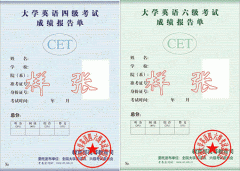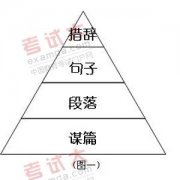(一)存在问题
第一,读不懂
所谓读不懂,就是考生拿过文章,满头雾水,即使硬着头皮读文章,也是一知半解。然后匆忙做体,仅凭感觉去蒙,因此做体准确率必然不高。
第二,读不快
读不快表现为,文章读完了,题也做完了,但往往是比考试要求多用15乃至20多分钟的时间。于是影响了其他问题的有效解答。匆忙起笔,必然影响整个四级的考试成绩。
第三,做不对
就是虽然文章也读懂了,但是一做题就错。
(二)解决办法
第一、掌握正确的阅读方法
考生平时阅读一般会采取良种阅读方法。一种是先看文章后看问题;另一种是先看问题,带着问题读文章。那么究竟哪一种方法比较好呢?笔者认为还是先看问题后读文章比较好。原因在于,先看问题,你可以熟悉出题人的出题角度。并且有题干,你可以划出题干的关键词,特别是四级考试中有一类题目属于“指代题或词汇题”,如下所示:
(一)词汇题
显著问法:the word “XXXX”(line X, part X) most probably means?
(二)指代题
显著问法:
1.代词指代:the pronoun“it/those/that/them” (line X, part X) refers to ?
2.名词指代:the word “XXXX”(line X, part X) refers to ?
先看问题后刊文章的好处就在于,可以通过问题先把上述“核心词”在原文中划出,然后再读文章的过程中,一旦独到,注意历史高度集中的,这样有助于提高做题的准确性。由此得出正确的阅读方法就是“五步阅读法”:
第一步,扫描题干抓关键。
即首先看选项,划出题干中的的关键词。题干关键词包括:数字、人名地名、专有名词、引号里的词语等等。
第二步,快速浏览全文,把握文章主旨大意标重点。
即快速浏览文章。在快速浏览文章的时候,不需要每一个单词和句子都读得懂,没有时间也没有这个必要。在第二步的过程中,考生们所要做的就是首先弄清楚这篇文章的中心思想是什么;其次,用笔在试卷上面标记出考试要考的重点。那么很多考生就会问,如何把握文章的主旨大意,如何标记文章的重点呢?
解答如下:
首先,把握文章的主旨大意。
要解决这个问题,需要分两步走。第一步,仔细阅读文章的首末段的首末句。因为英语文章段落结构上面我已经讲过。此外,西方人说话向来喜欢开门见山。所以英语文章段落70%都是一上来交待作者的写作目的或意图。第二步,要仔细阅读其他个段落的首句。然后把这两步综合起来,英语文章的主旨大意就可以把握住。
其次,如何标注文章的重点。
英语文章的重点主要有以下几点:
1.强转折:通常由“but, yet, however”引导。因为转折的作用一般来说是对前面的否定,对后面的肯定,因此转折词后面引导的成分往往是出题人容易出题的地方。特别是在文章中出现 but。
2.比较处:通常形式为“more/less---than---”。比较的作用在于通过比较突出某一点。比如more A than B的结构中,很显然是强调A,那么考生直接在A处划线,重点关注A就可以了。以此类推,less A than B,很显然是强调B,那么就直接在B处化线。它们是出题人喜欢出题的地方。
3.主旨句、主题句。这两个概念在上面写作部分我已经讲过。因为他们是高度概括性的句子,直接反映出作者的写作目的和意图,因此也是出题人的出题点。
另外还有因果句、特殊以文具、独立成段句、长难句乃至特殊标点符号等,都是需要考生在第一遍阅读时候,要划出的重点。
第三步,定位原文解剖句子。
就是在读完一遍文章的基础上,再看一遍问题。带着题干中的关键词迅速回原文定位,即找出这个问题出现在原文的第几段第几行。需要注意的一点,四级出题顺序由于是高度一致,所以一定要在文章当中找到出处。许多考生由于找不到出处,只能是凭第一遍的印象去猜答案,很显然做题准确性一定不高。
第四步,比较选项定答案。
在读懂文章句子的基础上,然后再次回到问题上来。看一下ABCD四个选项哪一个于原文中的意思是相对应的。当然在这个比较筛选过程中,很多同学往往会排除一到两个选项,剩下的两个选项就处于犹豫阶段,自己很难取舍。这在下面的如何提高做题准确率中讲到。
第五步,主旨态度最后做。
所谓主旨态度最后做就是,如果在五个问题中,第一个问题就问你,文章的中心思想、作者的写作意图或者做这些这篇文章的态度是什么。这时候考生可以先放过去。因为考生阅读第一遍文章的时候,只是掌握住文章粗枝大叶,这时候对文章还没有形成一个比较全面地了解。因此可以先放过去先做其他四个问题,待做完其他四个问题的时候再去作主旨题或是态度题,这样准确率就比较高一些。千万不要小看这一变化。这类题目作对的正确与否有可能直接决定着其他四个选项的正确率。
按照上述五步阅读法,我们来举例说明:
①Is there enough oil beneath the Arctic National Wildlife Refuge(保护区)(ANWR)to help secure America’s energy future? President Bush certainly thinks so. He has argued that tapping ANWR’s oil would help ease California’s electricity crisis and provide a major boost to the country’s energy independence. But no one knows for sure how much crude oil lies
buried beneath the frozen earth. With the last government survey, conducted in 1998, protecting output anywhere from 3 billion to 16 billion barrels.
②The oil industry goes with the high end of the range, which could equal as much as 10% of U.S. consumption for as long as six years. By pumping more than 1 million barrels a day from the reserve for the next two three decades, lobbyists
claim, the nation could cut back on imports equivalent to all shipments to the U.S.from Saudi Arabia. Sounds good. An oil boom would also mean a multibillion-dollar windfall (意外之材) in tax revenues, royalties(开采权使用费) and leasing fees for Alaska and the Federal Government. Best of all, advocates of drilling say, damage to the environment would be insignificant. “We’ve never had a document case of oilrig chasing deer out onto the pack ice.” says Alaska State Representative Scott Ogan.
④Not so far, say environmentalists. ③Sticking to the low end of government estimate, the National Resources Defense
Council says there may be no more than 3.2 billion barrels of economically recoverable oil in the coastal plain of ANWR, a drop in the bucket that would do virtually nothing to ease America’s energy problems. And consumers would wait up to a decade to gain any benefits, because drilling could begin only after much bargaining over leases, environmental permits and regulatory review. ⑤As for ANWR’s impact on the California power crisis, environmentalists point out that oil is responsible for only 1% of the Golden State’s electricity output and just 30% of the nation’s.
1. What does President Bush think of tapping oil in ANWR?
A. It will exhaust the nation’s oil reserves.
B. It will help secure the future of ANWR.
C. It will help reduce the nation’s oil imports.
D. It will increase America’s energy consumption.
2. We learn from the second paragraph that the American oil industry
A. believe that drilling for oil in ANWR will produce high yields.
B. Tends to exaggerate America’s reliance on foreign oil.
C. Shows little interest in tapping oil in ANWR.
D. Expects to stop oil imports from Saudi Arabia.
3. Those against oil drilling in ANWR argue that
A. It can cause serious damage to the environment.
B. It can do little to solve U.S. energy problems.
C. It will drain the oil reserves in the Alaskan region.
D. It will not much commercial value.
4. What do the environmentalists mean by saying “Not so fast” (Line .1, Para.3 )
A. Oil exploitation takes a long time.
B. The oil drilling should be delayed.
C. Don’t be too optimistic.
D. Don’t expect fast returns.
5. It can be learned from the passage that oil exploitation beneath ANWR’s frozen earth
A. remains a controversial issue.
B. Is expected to get under way soon.
C. Involves a lot of technological problems.
D. Will enable the U.S. to be oil independent.
第一步扫描题干抓关键,划出题干关键词。黑体下划线部分。
第二步,快速浏览全文,把握文章主旨大意标重点。黑体下划线部分为重点。
第三步,定位原文解剖句子。数字符标记处。你会发现和你读文章时化出的重点是高度吻合的。
第四步,比较选项定答案。黑体划线部分。







